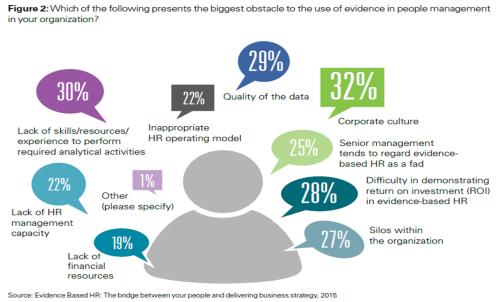I’m mindful of Laurie Ruettimann’s blog post from a couple of weeks ago where she put it straight out — HR Research Isn’t Research: It’s Marketing.
She ends her post with this:
Remember — today’s HR research is marketing, wrapped up in survey data, presented for consumption as sales collateral.”
And, of course, she’s right.
There’s value in those surveys and whitepapers
Lots and lots of surveys are fielded in the HR space by consulting firms, service and products providers, professional associations, academics, writers – heck, by anyone who wants to sell something to HR professionals. And many of those surveys are biased, have no real hypotheses, and the resulting whitepapers are designed to create the case for you want to buy whatever the sponsor is selling.
But this isn’t news. We all know this. HR professionals all over the world know this. And probably none of those whitepapers with their biased surveys ever propelled a sale.
But I still find value in these so-called research papers because they raise questions, spur investigation, create doubt, and motivate thinking. Not a bad thing for HR professionals. Asking questions, investigating additional data, analysis and research, creating doubt about the effectiveness of current practice and motivating thought to consider other ways of creating value for the business – these are all very good things.
I thought about all of this as I read KPMG’s recent whitepaper, Evidence-based HR: The bridge between your people and delivering business strategy. And as I read it, I thought about whether or not it was useful in creating a case for HR professionals to ask more questions, get a handle on organization data – not just HR data, and think about the future effectiveness of HR in the organization to drive greater business value.
And I believe it does. So I recommend that you read it with the understanding that KPMG would like to sell you some consulting services. (With a hat tip to Laurie.)
4 findings from the underlying data
The primary points are in no way earth shattering, but the underlying data give some new color to the discussion of HR, Big Data and creating business value:
- Evidence-based HR is still at the embryonic, pioneering stage.
- The progress of evidence-based HR is hampered by a negative perception of the HR function.
- Evidence threatens the established order, inevitably triggering resistance as a consequence.
- Whatever the obstacles, and whatever the resistance, the growth of evidence-based HR will gain momentum; companies and HR practitioners must respond urgently to avoid losing ground.
That third point was particularly interesting to me: “Evidence threatens the established order, inevitably triggering resistance as a consequence.” Evidence threatens the established order in human resources for HR professionals who believe the people part of the business is more art than science.
But that’s not new. It also threatens the established order in the C-Suite and in other functions where executives have free reign to act on their own experience and perceptions of what works in leading people. And resistance to HR analytics comes from locations in the organization other than HR.
That’s new — and also interesting.
The new era may also endanger the myth of the omnipotent executive, and the massive rewards that flow from it. Decisions based on gut instinct are now becoming exposed to immediate criticism. ‘Evidence suddenly makes people accountable, quite an uncomfortable feeling for some people…’ “
Considering corporate culture
I’m interested that some of those uncomfortable people are other than HR people.
The data in the report is presented appealingly. Here’s one graphic worth digging into:
An interesting finding is that the biggest obstacle to the use of evidence in people management is corporate culture. Not HR’s reputation, but corporate culture. That’s also new. and maybe worth considering.
A message to CEOs
KPMG’s concludes the report with this:
The days of basing people decisions on the whims or personal motives of one person at the helm are about to end. Organizations that acknowledge that inevitability already have a substantial head start.”
That’s more of a message to CEOs than it is to CHROs. It’s also more a message to the C-Suite than to HR practitioners. I just hope CHROs and HR practitioners are ready when the message is received!
This originally appeared on China Gorman’s blog at ChinaGorman.com.

